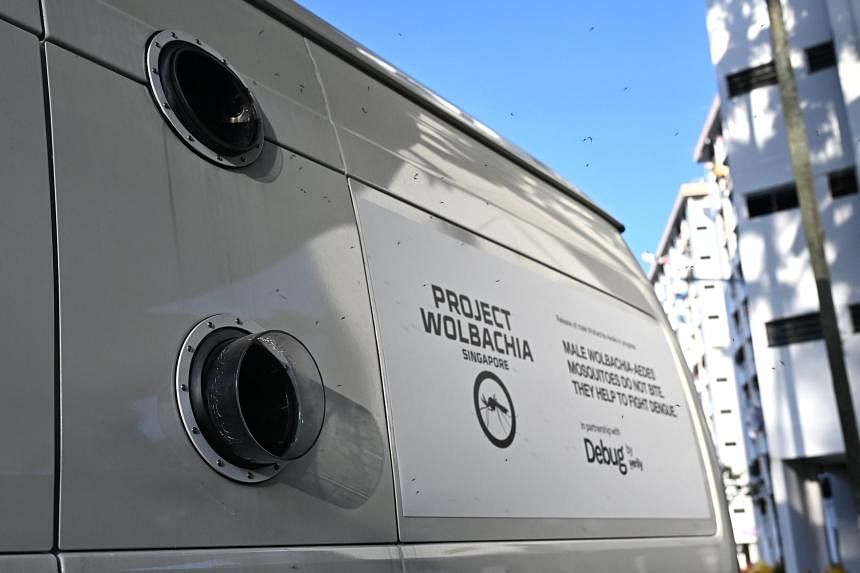SINGAPORE – When Clementi resident Neo Yu Ping, 36, returned home one night in February, she found some uninvited guests: more than 30 mosquitoes buzzing around the service yard of her flat.
The manager in the construction industry spent the next few days getting rid of the insects.
“I have a kid at home. I can’t be letting mosquitoes fly all around without caring. It’s not possible as a parent,” said the mother of a two-year-old boy, noting that mosquitoes had not been an issue for her in the three years since she moved into her Clementi Avenue 3 home.
The area is part of five new sites where male Wolbachia-carrying Aedes aegypti mosquitoes were released in February under the National Environment Agency’s (NEA) Project Wolbachia.
Male mosquitoes do not bite or transmit diseases. Only female mosquitoes seek out and bite hosts, such as humans, as they need protein from blood for the development of their eggs.
The scheme, which aims to bring down the population of the dengue-spreading Aedes aegypti mosquito, was also rolled out in Bukit Merah-Telok Blangah, Commonwealth, Holland and Marine Parade-Mountbatten. There have been more than 3,800 dengue cases in Singapore since the beginning of 2024.
Other residents, including in Mountbatten and West Coast, have also reported an uptick in mosquito numbers following the release of Wolbachia-Aedes mosquitoes.
The NEA said its risk assessments have shown that the Wolbachia technology is safe and that it poses no risks to human health.
Wolbachia is a genus of bacteria found naturally in more than 60 per cent of insect species, including butterflies. When male Wolbachia-carrying Aedes aegypti mosquitoes mate with urban female Aedes aegypti that do not carry Wolbachia, their resulting eggs do not hatch.
Project Wolbachia was first launched in 2016, and earlier trials had shown the success of the technology in curbing dengue infection rates.
NEA had previously said that residents in areas where Wolbachia-infected mosquitoes had been released for at least one year, such as Bukit Batok and Yishun, were up to 77 per cent less likely to be infected with dengue.
The latest round of mosquito releases would mean that 130,000 more households will receive the male Wolbachia-Aedes mosquitoes, bringing total coverage to 35 per cent of all households, NEA said.
The NEA spokesman said it observes a bump in the volume of feedback and queries from residents following the release of the non-biting mosquitoes in new areas.
But these numbers tend to fall after NEA officers address questions and concerns relating to the project and the technology, she added.
“Community surveys in 2016, 2019 and 2022 consistently revealed strong support for Project Wolbachia, with 96 per cent agreeing to or remaining neutral towards the release of the male Wolbachia-Aedes mosquitoes in their area,” she added.
This sentiment was also observed by MPs of the latest round of Wolbachia sites.
Mountbatten MP Lim Biow Chuan said he had received some feedback from residents about an increase in mosquitoes following the introduction of Project Wolbachia to his constituency. “They do grumble a bit, but they do understand why,” said Mr Lim.
Mr Ang Wei Neng, an MP for West Coast GRC, also said residents were initially concerned about an increase in the mosquito population but generally welcomed Project Wolbachia.
NEA said its gravitrap surveillance system, which attracts and traps egg-carrying female mosquitoes, had detected a higher number of such mosquitoes on the upper floors in some blocks.
Under Project Wolbachia, male mosquitoes are released at ground level and at higher floors for better distribution to more effectively reduce the population of urban female Aedes aegypti mosquitoes, NEA said.
Residents are advised to keep their doors and windows closed during the release periods – indicated on posters at Housing Board block lift lobbies and on its website – to minimise the number of mosquitoes entering their homes, NEA said.
People can also kill mosquitoes as they usually would as it can be difficult to tell the male and female mosquitoes apart, its spokesman added.


